Visit the Ultimate Toolbox main page for an overview and configuration guide to the Ultimate Toolbox library.
Contents
The Ultimate Toolbox Utility section contains classes that cover several areas of Windows programming that you might not ever care about... until you need them.
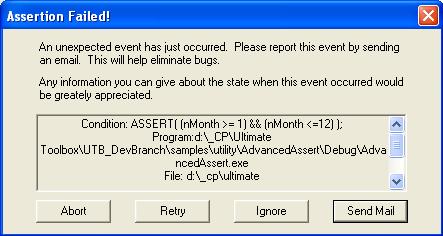
int nMonth = 0;
ASSERT( (nMonth >= 1) && (nMonth <=12) );
COXAdvancedAssert and COXAdvancedAssertMail can be used to invoke a custom assert dialog that can send a problem report via email.
Classes for saving/restoring application state and managing instances of a program.
COXWorkspaceState workspaceState;
workspaceState.StoreToFile("C:\\App.wsp");
workspaceState.StoreToRegistry();
A collection of classes for performing both simple integrity and cyclic redundancy checks.
Class COXCheckBase is the abstract base class used for deriving the classes which carry out integrity checking on data buffers.
The pure virtual function CalculateBlock() needs to be implemented by the derived classes.
Five derived classes - COXCheckSum8, COXCheckSum16, COXCheckSum32, COXCRC16, and COXCRC32 are provided for calculating 8, 16, and 32-bit checks. Note that the COXCheckSum... classes are the simplest integrity check methods (each involves a simple summation of each byte of data), while the COXCRC... classes perform cyclic redundancy checks.
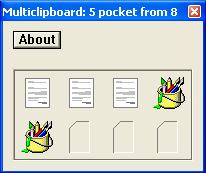
Classes that allow for monitoring and access to separate blocks of clipboard data. The COXMulticlipboardDlg manages a number of COXClipPocket objects which are populated as the clipboard is monitored.
...
COXClipPocket* pPocket=GetPocket(nPocketNumber);
ASSERT(pPocket);
COXToolTipCtrl* pTip=GetToolTip();
if (pPocket->GetDataType()==CF_TEXT)
{
tOXData* pData=pPocket->GetData();
...
(Archived*) Classes for command line parsing.
*Archived classes can be found in the archive\source and archive\include directories - there may or may not be a usage example project in the archive\samples dir. There should still be class information in the compiled HTML help documentation. These classes were classified as unsupported in the last commercial version (9.2) of the Ultimate Toolbox, and have not be updated for VS2005 compilation.
The COXInteger class can be used to represent large integers and/or perform radix conversions.
COXInteger integer;
integer.SetStringNumber(m_sInput, nRadixIn);
m_sOutput = integer.GetStringNumber(nRadixOut, m_bSeparated);
COXInteger a(_T("7B"), 16);
COXInteger b(456);
COXInteger c;
ASSERT(a == 123);
c = a + b;
ASSERT(c == 579);
a = b / 3;
ASSERT(a == 152);
c = c - 79;
ASSERT(c == 500);
ASSERT(c.GetStringNumber(2) == _T("111110100"));
COXWatchBuffer is a very simple class that allows you to monitor modifications to an array of bytes in memory.
Here, m_convertedBuffer is populated from a file, and later checked for modifications:
while ((nRead < nCount) && !bEOF)
{
nCopy = __min(nCount - nRead, (UINT)(m_nBufferLength -
m_nBufferPos));
if (nCopy != 0)
memcpy(lpBuf, m_convertedBuffer.Get(m_nBufferPos), nCopy);
lpBuf = LPBYTE(lpBuf) + nCopy;
m_nBufferPos += nCopy;
nRead += nCopy;
...
if (!m_convertedBuffer.IsModified())
return;
...
m_convertedBuffer.SetModified(FALSE);
The COXEventLog class provides NT Event log processing capabilities.
switch(m_nEvent)
{
case 0:
{
aInsertStrs[0] = _T("test.cpp");
aInsertStrs[1] = _T("Z");
m_EventLog.Report(eventError, MSG_FILE_NOT_FOUND, 0, 2,
aInsertStrs);
break;
}
case 1:
{
m_EventLog.Report(eventWarning, MSG_UNABLE_START_GUARDIAN);
break;
}
Classes for enumerating and creating NT services.
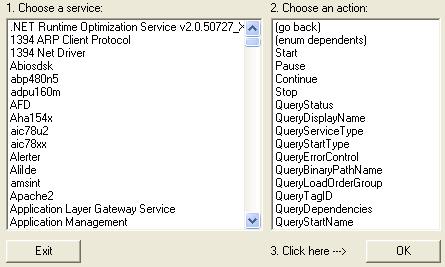
if (m_itersrv.StartIteration())
UpdateServiceList();
else
AfxMessageBox(_T("Failed to enumerate services."));
HTML, XML, and regular expression parsers.
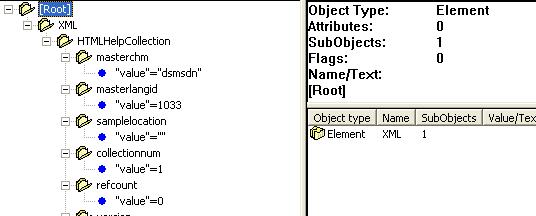
CParserViewDoc* pDoc = GetDocument();
COXParser* pParser = pDoc->GetParser();
HTREEITEM hItem = GetTreeCtrl().InsertItem(pParser->Root()->GetName(),
m_nCloseFolder,
m_nCloseFolder);
GetTreeCtrl().SetItemData(hItem, (DWORD) pParser->Root());
CWaitCursor wait;
FillTree(hItem, pParser->Root());
The COXProcess and COXProcessIterator classes for combine to provide for iterating and retrieving process properties.
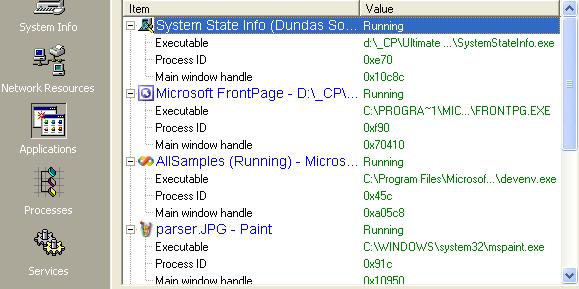
if(m_process.GetProcessImageFileName(
m_arrAppInfo[nIndex].dwProcessID,sValue))
{
htiItem=InsertItem(_T("Executable"),htiRoot);
...
Classes for identifying resources in files.
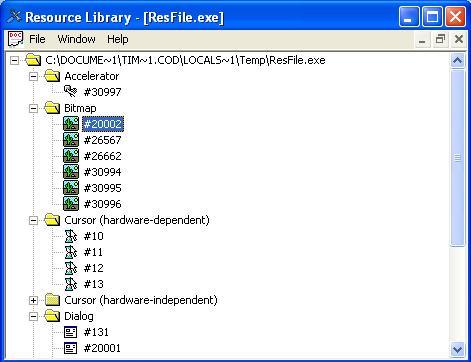
The
samples\utility\resfile sample in action.
See the Resource File article for more on these classes.
(Archived*) The COXResultPart and COXResultObj classes facilitate parsing and creating HRESULT codes.
*Archived classes can be found in the archive\source and archive\include directories. These directories are contained in the sample projects download. There may or may not be a usage example project in the archive\samples dir. There should still be class information in the compiled HTML help documentation. These classes were classified as unsupported in the last commercial version (9.2) of the Ultimate Toolbox, and have not be updated for VS2005 compilation.
(Archived*) The COXSerializer class encapsulates serialization and exception handling for any CObject based class.
*Archived classes can be found in the archive\source and archive\include directories. These directories are contained in the sample projects download. There may or may not be a usage example project in the archive\samples dir. There should still be class information in the compiled HTML help documentation. These classes were classified as unsupported in the last commercial version (9.2) of the Ultimate Toolbox, and have not be updated for VS2005 compilation.
COXSoundEffectManager and COXSoundEffectOrganizer manage sound effects for controls within your application.
See the Sound Manager article for more on these classes.
(Archived*) The COXSEHException class can trap various categories of SEH exceptions and translate to MFC exceptions.
*Archived classes can be found in the archive\source and archive\include directories. These directories are contained in the sample projects download. There may or may not be a usage example project in the archive\samples dir. There should still be class information in the compiled HTML help documentation. These classes were classified as unsupported in the last commercial version (9.2) of the Ultimate Toolbox, and have not be updated for VS2005 compilation.
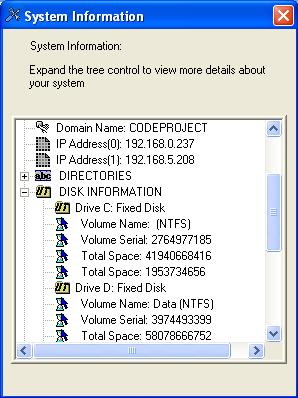 COXSysInfo
COXSysInfo in action.
COXSysInfo can provide easy access to various categories of windows version, network, and physical machine resources.
See the System Info article for more the usage of the COXSysInfo class.
Fine grained synchronous and asynchronous timing.
The unit that is used throughout the COXTimer class is the ns (nanosecond). This granularity is fine enough for all applications because it is quicker than the hardware clock frequency. If you have a 200 MHz processor the clock will produce a pulse every 5 ns.
This also means that when you can specify a parameter in nanoseconds it is possible that the underlying hardware (and the Windows API) is not capable of such a fine accuracy. Where possible the actual resolution is provided.
COXTimer timer;
LONGLONG acc = timer.GetIntervalAccuracy();
COXTimer can be used to measure intervals by calling StartInterval and StopInterval on a particular timer object, or can be set to provide a notification by invoking a specified callback function:
void CallBack(COXTimer* pTimer) {
...
};
m_timer.StartNotifier(nDelay, pfCallback, bPeriodic, bSynchronized,
nAccuracy);
COXTrace provides some simple extensions for the MFC TRACE macro.
void CMyClass::MyFunction(int length)
{
COXTRACE("Entering MyFunction");
OXTRACE_WRITE("Hello world... etc.");
}
A simple class to read version information from a file.
After calling COXVersionInfo::ReadInfo with the module name, the following public data members can be examined:
DWORD m_dwSignature;
DWORD m_dwStrucVersion;
DWORD m_dwFileVersionMS;
DWORD m_dwFileVersionLS;
DWORD m_dwProductVersionMS;
DWORD m_dwProductVersionLS;
DWORD m_dwFileFlagsMask;
DWORD m_dwFileFlags;
DWORD m_dwFileOS;
DWORD m_dwFileType;
DWORD m_dwFileSubtype;
DWORD m_dwFileDateMS;
DWORD m_dwFileDateLS;
DWORD m_dwLanguageCountryID;
CString m_sLanguageCountry;
CString m_sComments;
CString m_sCompanyName;
CString m_sFileDescription;
CString m_sFileVersion;
CString m_sInternalName;
CString m_sLegalCopyright;
CString m_sLegalTrademarks;
CString m_sOriginalFilename;
CString m_sPrivateBuild;
CString m_sProductName;
CString m_sProductVersion;
CString m_sSpecialBuild;
Classes for accessing and monitoring the registry.
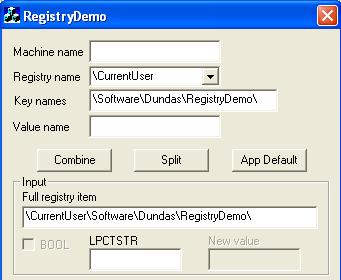
COXRegistryIteratorItem allows for iterating registry keys and subkeys, while COXRegistryItem encapsulates a registry item.
Initial CodeProject release August 2007.
